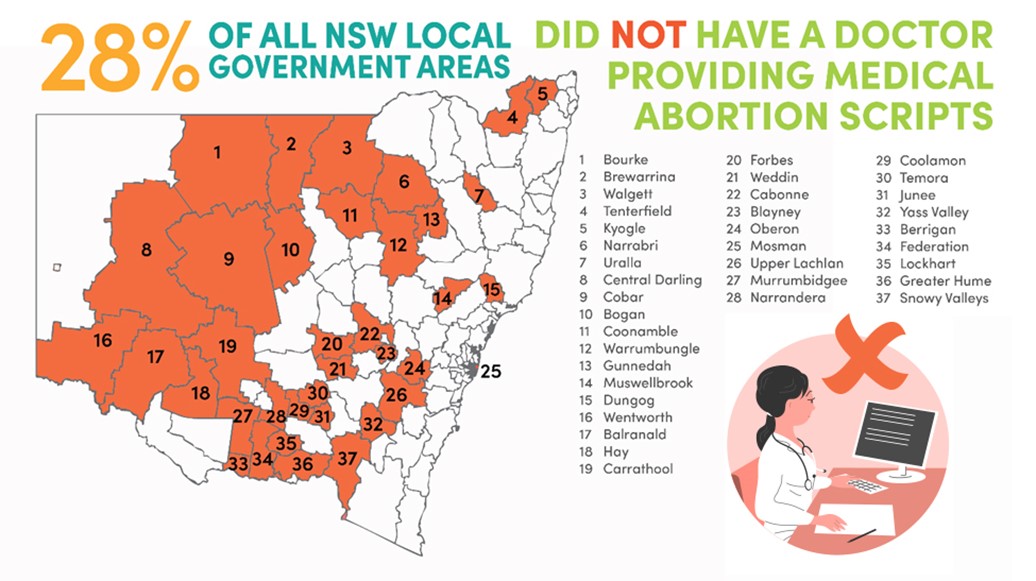Medical abortions most used but least available in the bush
Thursday December 12 2024
A new report from Family Planning Australia tracks medical abortions across NSW for the first time and highlights stark variations between where patients seeking healthcare live, and where healthcare providers are based.
The report Use of Medical Abortion Services in NSW, Australia, between 2018-2022, shows that women in regional and rural NSW seek medical abortion at more than double the rate of city women.
In remote NSW there were 10 medical abortion prescriptions issued for every 1000 women in 2022 and in major cities there were just 4.2 medical abortion prescriptions for every 1000 women.
Family Planning Australia Senior Researcher Dr Emmalee Ford said the report also highlighted 37 local government areas where no doctor was providing medical abortion scripts to women.
"This represents 28 per cent of all local government areas across NSW and most of them are in rural and regional areas," Dr Ford said.
"So, the report really highlights the access challenges that can be faced by people living in the country. Rural local government areas that need greater services near home include Oberon, Carrathool, and Walgett."
The contrast is significant when you compare our most remote location, Far West Local Health District, with our most urban areas, South Eastern Sydney and Sydney local health districts.
Women in Far West Local Health District were the most likely to seek a medical abortion in 2022, 10.7 women in every 1,000 and had a prescriber rate of 5.5 prescribers for every 1,000 women.
Women in South Eastern Sydney Local Health District were the least likely to seek a medical abortion, 2.7 women, in every 1000 with a prescriber rate of 8 for every 1000 women. The highest prescriber rate in the state is Sydney Local Health District, 17.4 for every 1000 women, and 3.1 women for every 1000 sought a medical abortion in 2022.
"These much higher prescription rates in Far West Local Health District are mismatched with a low healthcare workforce rate in the area," Dr Ford said.
Family Planning Australia CEO Sue Shilbury said the report highlighted the need to better match services to areas of patient demand.
"This report is an important tool for informing healthcare planning. In it, we can see the strong need for more prescribers to find their way to country towns so people can get healthcare near where they live," Ms Shilbury said.
The report also highlights that while a lot of medical abortions can take place in clinics and GP offices, a lack of prescribers in many areas suggests there may be parts of the state where patients could need support from public health, not for profit agencies and private providers to access care.
"The 2024 Federal Budget made the Medicare rebate for telehealth services permanent for anyone seeking reproductive and sexual health care or pregnancy counselling. Family Planning Australia can offer medical abortion to some pregnant people through telehealth. This can help improve access for people in rural and regional areas however, we'd still like to see more local doctors offering medical abortions in non-metropolitan areas."
Availability of medical abortion medication through pharmacies was somewhat stable between regional and metropolitan areas during the reporting period. Since the data was collected changes to pharmacy dispensing have simplified access to medical abortion drugs, MS-2 Step, at pharmacies.
The report uses PBS data from Services Australia on MS-2 Step prescriptions.
Key facts:
- Nepean Blue Mountains Local Health District has the lowest prescriber rate, 1.2 for every 1000 women.
- Mid North Coast Local Health District has the lowest prescriber rate of the non-metropolitan LHDs. 1.7 for every 1000 women.
- Across NSW the use of medical abortion has increased from 3.1 in every 1000 women in 2018 to 4.9 in every 1000 women in 2022.
- Young women aged 20 to 29, 8.8 for every 1000 women, and 30 to 39 years, 6.1 for every 1000 women, are the highest users of medical abortion in NSW.

Media enquiries:
P: 0421 619 097
E: media@fpnsw.org.au
W: https://www.fpnsw.org.au/


